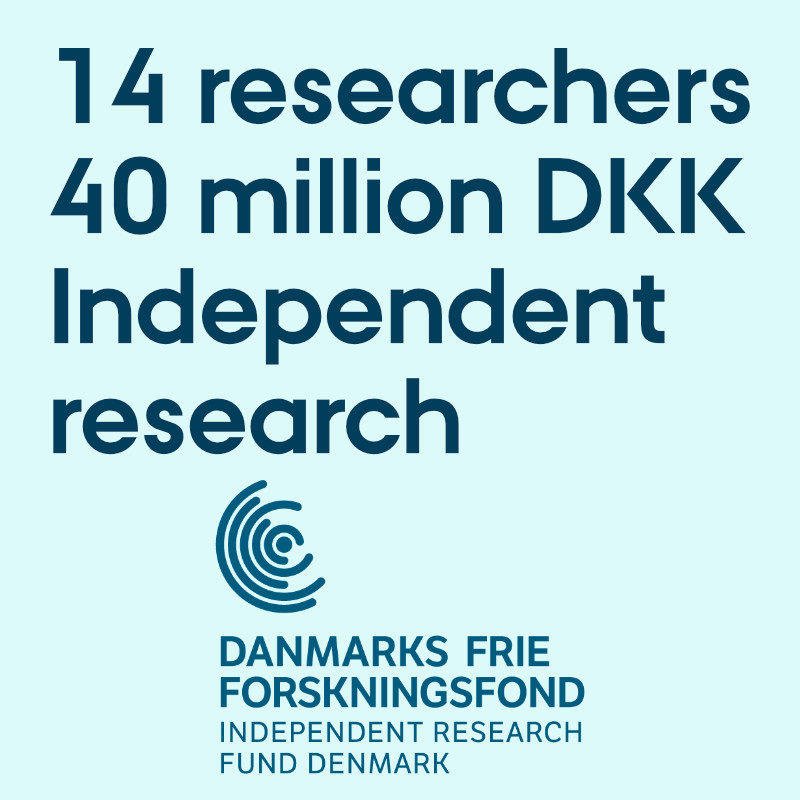Researchers from Health receive DKK 40 million for non-targeted research
Acute cardiac failure, atherosclerosis, high blood pressure, renal failure and viral infections in the brain. These are just some of the research areas within the medical and health sciences, which the Independent Research Fund Denmark support with grants to fourteen of the faculty's researchers. A total of a little over DKK 40 million has been granted to the researchers.

Professor Trine Hyrup Mogensen is one of the researchers from Health to receive funding from the Independent Research Fund Denmark. She conducts research into the immune system and infectious diseases and receives DKK 2,878,797 to investigate the immunological mechanisms which help the brain fight herpes simplex virus (HSV) infections.
Trine Hyrup Mogensen and her colleagues have previously identified a mutation in the gene that encodes the transcription factor IRF3 in patients with herpesvirus infection of the brain. IRF3 is a central cellular signalling molecule, which is necessary to fight viral infections in the brain. If IRF3 is defective, it may be a contributing factor in serious inflammation of the brain caused by HSV.
Why are some people more susceptible to infections than others?
The research team headed by Trine Hyrup Mogensen will begin the new research project on the assumption that immune defects caused by rare mutations are the key factor leading to increased susceptibility to the disease. If the assumption proves to be correct, the mapping of gene defects in patients with brain inflammation caused by herpes viruses may serve as a platform for uncovering important new knowledge about how the immune system fights serious viral infections in the brain.
The other grant recipients from Health are:
- Professor Søren Riis Paludan, Department of Biomedicine, receives DKK 6,192,001 to identify and characterise mechanisms for antiviral defence in epithelial cells.
- Professor Nicola Pavese, Department of Clinical Medicine, examines whether spinal cord stimulation (SCS) can be used in the treatment of Parkinson's patients who are walking-impaired. He receives DKK 6,087,463 for this purpose.
- Professor Robert Andrew Fenton, Department of Biomedicine, receives DKK 2,873,023. He will utilise a new mouse model to investigate the ability of a specific protein to control salt levels and blood pressure with a view to developing treatment of high blood pressure and other diseases.
- Associate Professor Rasmus Otkjær Bak, Department of Biomedicine, utilises CRISPR/Cas technology in his project to convert genetically modified blood stem cells into a specific type of immune cell which can e.g. fight cancer. The Independent Research Fund Denmark is supporting the project with DKK 2,880,000.
- Professor Steffen Thiel, Department of Biomedicine, receives DKK 2,818,076 to design a new treatment of the complex autoimmune disease lupus. The treatment is directed partly towards the innate immune system, which generates inflammation in patients, and partly towards the part of the immune system that forms autoimmune antibodies.
- Professor, Department Chair and the new Vice-dean for Research Hans Erik Bøtker, Department of Clinical Medicine, receives DKK 1,131,841 for his research into cardiac failure. In this project he investigates ketones as a new life-prolonging and/or function-improving treatment option for patients with heart failure.
- Professor Jacob Fog Bentzon, Department of Clinical Medicine, will analyse whether atherosclerosis in humans is driven by the intense growth of a small number of smooth muscle cells, as is the case in mice. The hope is to develop new treatment and prevent arteriosclerosis from triggering blood clots. The project receives DKK 1,275,552.
- Clinical professor Claus Højbjerg Gravholt, Department of Clinical Medicine, receives DKK 1,992,303 to determine the genetic mechanisms that underlie the development of ?Turner Syndrome – a rare disease that often affects women who are missing an X chromosome.
- Professor Jeppe Prætorius, Department of Biomedicine, receives DKK 2,730,359 for his research into the treatment of patients with elevated pressure in the skull as a result of e.g. cerebral haemorrhage.
- Professor Henrik Saabye Wiggers, Department of Clinical Medicine, examines whether the addition of ketones can improve the heart's pumping capacity and cardiac minute volume in patients with acute cardiac failure and circulatory failure – both the acute effect on the circulatory system and the effect of longer-term treatment. He receives DKK 1,999,934 for the project.
- Professor Jens Peter Andersen, Department of Biomedicine, receives a grant of DKK 2,505,600 for his research into flippases and will carry out a series of mutation studies to clarify where and how in the protein the lipid substrate moves.
- Clinical Associate Professor Christian Fynbo Christiansen, Department of Clinical Medicine, receives a grant for his project to uncover how renal failure affects the risk of subsequently developing chronic kidney disease, cardiovascular disease and premature death. The Independent Research Fund Denmark is supporting the project with DKK 2,098,978.
- Professor Leif Østergaard, Department of Clinical Medicine, receives DKK 2,874,895 for his research into the brain's blood supply. The research aims to contribute to better interpretations of the brain's activity based on its blood supply, and to understand the role of interneurons in connection with the development of dementia.
Interdisciplinary grant to epilepsy research
In addition, Professor Sándor Beniczky from the Department of Clinical Medicine receives one of the Independent Research Fund Denmark‘s earmarked interdisciplinary research grants. Sándor Beniczky conducts research into epilepsy and anti-epileptic treatment, and in the new research project he will study whether an online alarm of epileptic seizures is possible with a wearable and wireless ECG. The project receives DKK 2,879,932 in support from the Independent Research Fund Denmark.
Several of Health's grant recipients are affiliated with departments at Aarhus University Hospital.
In this round of grants, the Independent Research Fund Denmark is providing a total of DKK 696 million in financial support for 202 new ideas. The research projects span all of the central academic fields and come from all corners of Denmark’s research environments. Read more about the projects on the Independent Research Fund Denmark’s website (in Danish).
This coverage is partly based on press material from the Independent Research Fund Denmark
